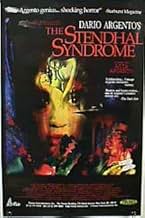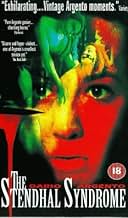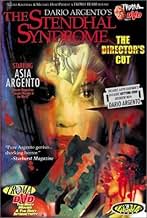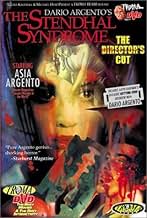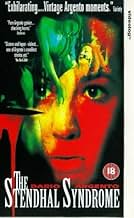IMDb RATING
6.0/10
9.7K
YOUR RATING
A detective falls under hallucinatory spells while trying to capture the sadistic man who raped her.A detective falls under hallucinatory spells while trying to capture the sadistic man who raped her.A detective falls under hallucinatory spells while trying to capture the sadistic man who raped her.
- Awards
- 1 win & 6 nominations total
Featured reviews
The Stendhal Syndrome is said to be a disorder where, upon viewing works of art, a person suffers from chills, anxiety attacks, and hallucinations where they believe they're actually in the paintings themselves. Don't ask me how real or common this disorder is since I'm not a doctor, but it sure makes for an interesting case study in Dario Argento's The Stendhal Syndrome.
Anna Manni (Asia Argento) is an Italian police detective who goes to an art museum due to an phone tip from a woman claiming that she knows a serial rapist and murderer will be there. Once there, Anna suffers from an attack of Stendhal and ends up getting knocked out. When she comes to, a man is there and he follows her back to her room, rapes her, and kidnaps her, forcing her to watch him murder another victim. She flees from the scene, but the worst is yet to come.
It's hard to talk about this film without spoiling everything, but let's just say that the character of Anna goes through several transitions throughout the film. The 1st act of the film is pretty gripping and the 2nd act isn't terrible either, but by the 3rd act, you get the feeling like they don't know how to wrap this up so they're just stalling and making up stuff to distract us from the fact that the movie hasn't cleared for landing yet. By the end, you'll definitely be left scratching your head and wishing they'd have just ended it a half hour sooner.
Asia Argento isn't ideally suited for the role either and only seems to really come to life during the 2nd act where she adopts a touch, butch persona. She seems uncomfortable in the 1st and 3rd acts. There are also some questionable CGI effects throughout that take you out of the movie and it's not as stylish as many of Dario Argento's other works.
Anna Manni (Asia Argento) is an Italian police detective who goes to an art museum due to an phone tip from a woman claiming that she knows a serial rapist and murderer will be there. Once there, Anna suffers from an attack of Stendhal and ends up getting knocked out. When she comes to, a man is there and he follows her back to her room, rapes her, and kidnaps her, forcing her to watch him murder another victim. She flees from the scene, but the worst is yet to come.
It's hard to talk about this film without spoiling everything, but let's just say that the character of Anna goes through several transitions throughout the film. The 1st act of the film is pretty gripping and the 2nd act isn't terrible either, but by the 3rd act, you get the feeling like they don't know how to wrap this up so they're just stalling and making up stuff to distract us from the fact that the movie hasn't cleared for landing yet. By the end, you'll definitely be left scratching your head and wishing they'd have just ended it a half hour sooner.
Asia Argento isn't ideally suited for the role either and only seems to really come to life during the 2nd act where she adopts a touch, butch persona. She seems uncomfortable in the 1st and 3rd acts. There are also some questionable CGI effects throughout that take you out of the movie and it's not as stylish as many of Dario Argento's other works.
Argento has been cursed with a number of duds in recent years. 'Two Evil Eyes', 'The Phantom of the Opera', 'Sleepless', 'The Card Player' and one of the worst MASTERS OF HORROR episodes yet 'Jenifer'. However, the beautiful, poignant 'The Stendhal Syndrome' is an extremely well crafted rose between a number of poisonous thorns. It sees a return to the atmospheric dream-like charm of his earlier films like 'Phenomena' and 'Suspiria', but adopting his more recent sadism (it's always there, just a different style in his newer films) that gave slight high points in his otherwise dull modern films. After two poorly reviewed films ('Trauma' and 'Two Evil Eyes') Argento has finally done it right.
The film stars his daughter, Asia (whose interesting relationship with Dario adds to the intriguing and off-beat persona he puts out), as Anna, a beautiful police detective in Rome. When she is targeted by the serial killer she is hunting, she is raped and beaten and so leads Argento's best character study and one of the most intense of his films to date. Rather than following the madman as he offs prostitutes and impressionable young women through Italy (the film lightly touches on it, but the more left to the imagination the better), the film follows Anna as she loses grip on reality and develops a strange disease in which she can ever paintings in her mind and they help solve the case, called the Stendhal Syndrome. As the film goes on the attacks on Anna become more and more vicious, and the final climatic ending is one of Argento's best.
Asia delivers a interesting performance, to say it is good is to stretch the truth, but it is suited to the role and you can tell she has a lot of acting talent. All the other performances are rather flat, but as with all of Agento's films the performances aren't what really matter. The cinematography is bland, but as with Asia's performance suits the film better than if it were Technicolor. The tension and music is amazing, the film devotes itself to really unsettling you, rather than just entertaining you like other recent Argento's. 'The Stendhal Syndrome' is probably the most violent and disturbing I've seen the man go, the rape and murder scenes are gratuitously sadistic and the scenes where Anna is raped are bordering on exploitation.
Overall 'The Stendhal Syndrome' is a fantastic return to form fr Argento, and I hope 'The Third Mother' is anywhere near as well-crafted as this.
7/10
The film stars his daughter, Asia (whose interesting relationship with Dario adds to the intriguing and off-beat persona he puts out), as Anna, a beautiful police detective in Rome. When she is targeted by the serial killer she is hunting, she is raped and beaten and so leads Argento's best character study and one of the most intense of his films to date. Rather than following the madman as he offs prostitutes and impressionable young women through Italy (the film lightly touches on it, but the more left to the imagination the better), the film follows Anna as she loses grip on reality and develops a strange disease in which she can ever paintings in her mind and they help solve the case, called the Stendhal Syndrome. As the film goes on the attacks on Anna become more and more vicious, and the final climatic ending is one of Argento's best.
Asia delivers a interesting performance, to say it is good is to stretch the truth, but it is suited to the role and you can tell she has a lot of acting talent. All the other performances are rather flat, but as with all of Agento's films the performances aren't what really matter. The cinematography is bland, but as with Asia's performance suits the film better than if it were Technicolor. The tension and music is amazing, the film devotes itself to really unsettling you, rather than just entertaining you like other recent Argento's. 'The Stendhal Syndrome' is probably the most violent and disturbing I've seen the man go, the rape and murder scenes are gratuitously sadistic and the scenes where Anna is raped are bordering on exploitation.
Overall 'The Stendhal Syndrome' is a fantastic return to form fr Argento, and I hope 'The Third Mother' is anywhere near as well-crafted as this.
7/10
What makes up the singular pleasure that is Dario Argento? Maybe it's the crossroads where High Romanticism and hardcore porn meet. (I'm referring to the feeling of his work--not the images.) Argento seems doomed, like Peckinpah and like Lynch, to have summed up his world-view in a single masterpiece, the 1977 SUSPIRIA; the thrillers that came before and the low-budget shockers that came after may offer delights, but nothing close to that unity of vision.
Seeing THE STENDHAL SYNDROME projected in Los Angeles, I was struck with newfound sympathy for the Star Wars fans protesting way too much in favor of THE PHANTOM MENACE. If you love THE STENDHAL SYNDROME, you love Argento, and that is that--you may see the flaws, but they don't ruin your pleasure. The picture has too many Achilles heels to enumerate here, but what's important is that nobody in world cinema today is wrestling with his soul in the psychosexual mire the way Argento does. He puts his misogynistic demons and his almost sentimental compassion right out there; and only Cronenberg has such a direct pipeline to his own unconscious. Not to mention the fabulous, cascading images--Argento's stock-in-trade is Victorian Liebestod, Edward Gorey gone porno, and THE STENDHAL SYNDROME has sequences that rank with his best.
The sketchy thing about STENDHAL SYNDROME, like the maestro's TRAUMA, is his use of his daughter, Asia Argento, in scenes one cannot imagine a father watching, much less filming. Whatever memoirs come down the pike twenty years later, it must be said: Argento for certain lets it all hang out, and the land-mined terrain he maps is, to my taste, thrilling.
Seeing THE STENDHAL SYNDROME projected in Los Angeles, I was struck with newfound sympathy for the Star Wars fans protesting way too much in favor of THE PHANTOM MENACE. If you love THE STENDHAL SYNDROME, you love Argento, and that is that--you may see the flaws, but they don't ruin your pleasure. The picture has too many Achilles heels to enumerate here, but what's important is that nobody in world cinema today is wrestling with his soul in the psychosexual mire the way Argento does. He puts his misogynistic demons and his almost sentimental compassion right out there; and only Cronenberg has such a direct pipeline to his own unconscious. Not to mention the fabulous, cascading images--Argento's stock-in-trade is Victorian Liebestod, Edward Gorey gone porno, and THE STENDHAL SYNDROME has sequences that rank with his best.
The sketchy thing about STENDHAL SYNDROME, like the maestro's TRAUMA, is his use of his daughter, Asia Argento, in scenes one cannot imagine a father watching, much less filming. Whatever memoirs come down the pike twenty years later, it must be said: Argento for certain lets it all hang out, and the land-mined terrain he maps is, to my taste, thrilling.
La Syndrome di Stendahl has met cruel critical comments on its initial release but although it is not at all like his earlier work, it is in fact a far more intelligent and mature affair. Anna Manni, the character played by Asia Argento, has more compassion than any other character in an Argento film, quite unlike the carelessly created cartoon-like characters of his other work. It is true, however that the film drags slightly in the middle, although picks up the pace again for a surprising and beautifully directed finale; and although the film is not as bloody as tenebrae, the violence on display is brutal and sexual (leading to it being cut for release in Britain) and genuinely disturbing. Perhaps not as good as Deep Red or Suspiria, but definitely one of this unusual director's better efforts.
Argento had seen his better days as a movie director and surely it's not easy to top such masterpieces such as Suspiria and The Inferno.
Asia Argento as detective Anna Manni isn't the best casting choice but as an actress she certainly did her best. It's difficult to believe that she really is a police detective at such a young age. It's obvious that a more mature actress should have been cast. Nevertheless that obscurity could have been used to make the film better. Would it be a better film if Anna Manni was just a woman living in her delusions.
The film certainly had it's moments but on the other hand it has some annoying flaws such as very bad cgi effects. Why use experimental effects if they look dumb. They should have gone back in time to the 70's or 80's how they made the effects without computers.
Ennio Morricone's score is amazing though and certainly does a big favor for the film's atmosphere. To sum it up this film is watchable even for Argento fans but it isn't anything like his films used to be. It's really evident that Italian film industry had been in a recession since the late 80's.
Asia Argento as detective Anna Manni isn't the best casting choice but as an actress she certainly did her best. It's difficult to believe that she really is a police detective at such a young age. It's obvious that a more mature actress should have been cast. Nevertheless that obscurity could have been used to make the film better. Would it be a better film if Anna Manni was just a woman living in her delusions.
The film certainly had it's moments but on the other hand it has some annoying flaws such as very bad cgi effects. Why use experimental effects if they look dumb. They should have gone back in time to the 70's or 80's how they made the effects without computers.
Ennio Morricone's score is amazing though and certainly does a big favor for the film's atmosphere. To sum it up this film is watchable even for Argento fans but it isn't anything like his films used to be. It's really evident that Italian film industry had been in a recession since the late 80's.
Did you know
- TriviaThe opening scene was shot inside the famous Uffizi Gallery in Florence. As of 2014, Dario Argento is the only director who's ever received permission to film inside the museum.
- GoofsThough featuring prominently during the film's opening sequence set at the Uffizi in Florecne, Peter Bruegel's 'Landscape with the Fall of Icarus' is actually housed at the Royal Museum of Fine Arts of Belgium in Brussels.
- Quotes
Insp. Manetti: You're young. I can trust you.
- Alternate versionsUS DVD release by Troma release is the complete version of the English language edition, but, like all English releases, is still missing around 2 minutes of material exclusive to the Italian print.
Details
Box office
- Budget
- $3,800,000 (estimated)
- Runtime
- 1h 53m(113 min)
- Color
- Sound mix
- Aspect ratio
- 1.85 : 1
Contribute to this page
Suggest an edit or add missing content


